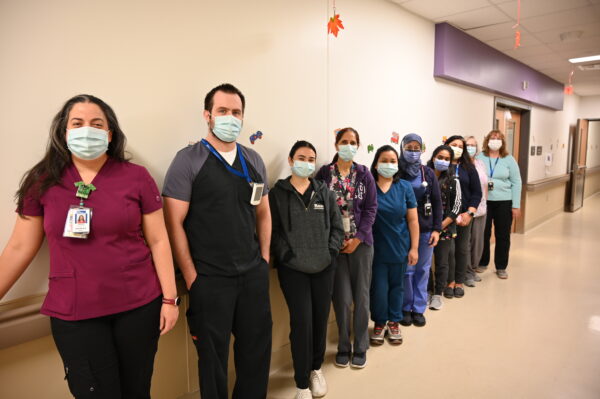World Prematurity Day with Humber River’s NICU
17
Nov
2021
November 17 is World Prematurity Day- a time used to raise awareness of preterm birth, highlighting concerns, treatments, and strategies to maintain a healthy pregnancy to decrease the risk of preterm birth. Humber River Health’s NICU team commonly assists babies with concerns of prematurity and has shared information regarding the day.
What are the treatments, procedures, or services offered in the NICU at Humber River Health?
In the NICU, we work with an interdisciplinary team of social workers, occupational therapists, respiratory therapists, lactation consultants, registered dieticians, pharmacists, child life specialists, paediatricians, and neonatologists to provide patient care. We provide high-quality, safe care in all areas of the program, including specialized care for babies. Our staff is skilled in caring for babies of high-risk pregnancies, able to provide short-term ventilation and stabilization and transfers if required. We also have a neonatal follow-up clinic for high-risk babies to be seen after discharge, such as those babies born prematurely. Finally, our NICU team works with other hospitals to ensure babies and their families receive care as close to their homes as possible.
Why are babies admitted into the NICU, and how long do they typically remain there?
There are numerous reasons for babies to be admitted into the NICU. Some reasons include:
- Premature
- Respiratory Distress
- Jaundice
The majority of babies admitted to our NICU have concerns related to prematurity, such as issues with breathing and feeding. Most remain in our NICU for an average of 10.2 days.
What classifies a baby as premature?
Babies born any time less than 36 weeks are considered premature, such as those born more than a month early.
When monitoring premature babies in the NICU, what do you monitor/lookout for specifically?
In the NICU, we predominately monitor babies to ensure they are breathing comfortably and at a normal rate. We look for signs that may indicate breathing difficulties, such as changes in skin colour, increased respiratory rate or work of breathing, or apnea (pauses in breathing). We also monitor how the baby is feeding to ensure they are growing at the recommended rate for their age and weight and are getting enough calories and nutrients. Other types of assessments conducted by the NICU nurses are dependent on the reason the baby was admitted to the NICU and how the baby is progressing.
What treatments might a premature baby undergo?
When babies are born prematurely, they may undergo the following treatments:
- Cardiorespiratory monitoring
- Feeding support (by tube feed or special IVs)
- X-Rays
- Ultrasounds
- Blood work
What advice do you have for pregnant women to help them maintain a healthy pregnancy and lower their risk of undergoing a preterm birth?
One of the most important strategies in preventing preterm birth is the attendance of prenatal visits with your health care provider. Preventing preterm birth requires continuous risk assessment, as well as a timely introduction of heightened surveillance and treatment when appropriate. Preventing a premature birth is a complex, unsolved problem in perinatal medicine. However, attendance of scheduled appointments has proven to help carriers maintain a healthy pregnancy and reduce the risk of preterm birth.
Any additional comments?
In our NICU, parents play a vital role in the care of their babies. We want parents to feel that they are an integral part of the team in making decisions regarding the care of their baby. We encourage parents to be with their baby and be involved as much as possible so they feel more comfortable when it is time to go home.

